We often need to encourage children to read, but babies love books, and that’s because they associate books with closeness and warm relationships. The cosy, intimate snuggle we share with babies as we read to them is powerful. I cannot stress how much babies benefit from the bonding experiences of being read to. It also develops their oral language, the start of their journey to becoming fluent talkers and enthusiastic readers.
Much of this begins at home, but the nursery is a brilliant place to support a small child’s delight in discovering books as it provides an effective bridge from home learning. Books open up a window on the world for babies, both real and imaginary, which is why they are an essential nursery resource. There are tonnes written on the power of books, so I am focussing here on my top three reasons why babies love books.
Babies love books reason 1: touching
It’s more important than ever in this technology-obsessed world that parents receive support from nurseries on why reading a book to their child matters. Many parents have replaced the book with a phone or a tablet for their own reading, so it stands to reason that this behaviour will extend to what their children read. We now frequently see children trying to turn pages in books by swiping – clearly imitating their parents’ interaction with their phones! It is easy to forget that children watch us and imitate even our most subtle actions.
Babies love books, whether fabric, washable, cardboard, pop up, with pictures, without pictures, with words, without words. They become positive about books from handling them as they learn how to turn pages, look at words, and point at pictures. The benefits of books extend as children grow. For example, we know that children who have been read to before starting school score higher on national literacy tests than children who have not been read stories.
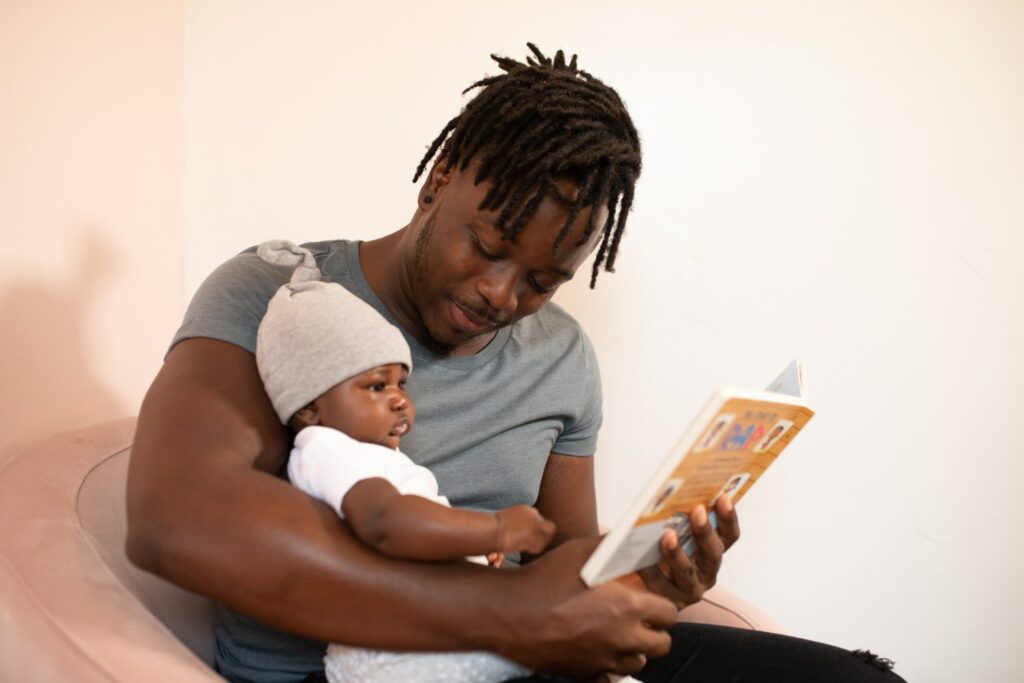
Babies love books reason 2: communicating
One of the most important elements of a child’s development is their ability to speak, listen and communicate verbally and non-verbally. Good oral language ability puts a child on the path to being a good reader. Children begin to understand words before they can say them and need opportunities to practise their language in a range of circumstances. Generally, children need to put two words together by the age of two, have about 1,000 words in their vocabulary at age three and be fluent in at least 2,100 words at age four.
Children also need to hear a new word about 20 times before it becomes part of their vocabulary, and reading books to them helps build that. Learning is hard work for children, and we need to help them. As professionals, we view the child as an apprentice learner, with adults supporting and extending their learning through child-centred, well-structured teaching. In other words, the art, craft and science of early years teaching.
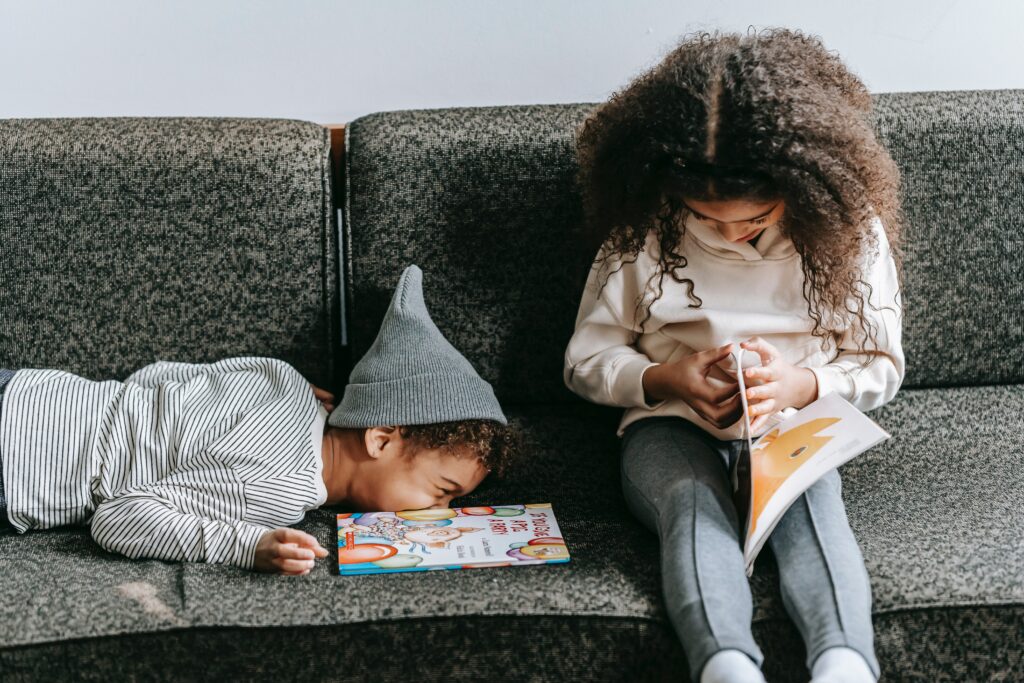
Reading floats on a sea of talk, so nursery teachers need to be magnets for communication; enjoying a chat, engaging in deep discussions, asking questions and telling and reading stories. Every nursery needs a cosy sofa to make it even easier for conversations to happen.
Communication is the foundation for learning, and children are keen, eager and remarkably attuned communicators from birth. Books are essential in the child’s journey to becoming a communicator and developing their confidence and skills in speaking and listening in various situations.
Babies love books reason 3: learning
Confident nursery teachers understand that reading is a complex process and a first step in learning new information. To help children become readers, they must be ready to create literacy-rich nurseries filled with books that support this.
Every nursery teacher needs to have a selection of books they really love. A book for every occasion, whether it’s to encourage singing, poetry, drama, dancing, fairy stories, dual language, information or nursery rhymes – the list is endless. I am very honoured to be a trustee of the Booktrust, which delights in children’s books and provides a huge source of information.
For nursery group times, good teachers appreciate the powerful part books play in developing reading techniques and learning. I like the dialogic reading approach as it is interactive, where the child is the reader, and the teacher questions them about the book. At the nursery level, there is also a focus on technical skills such as linking letter recognition, sounds, words, syntax and cues to understand the meaning and context of the book.
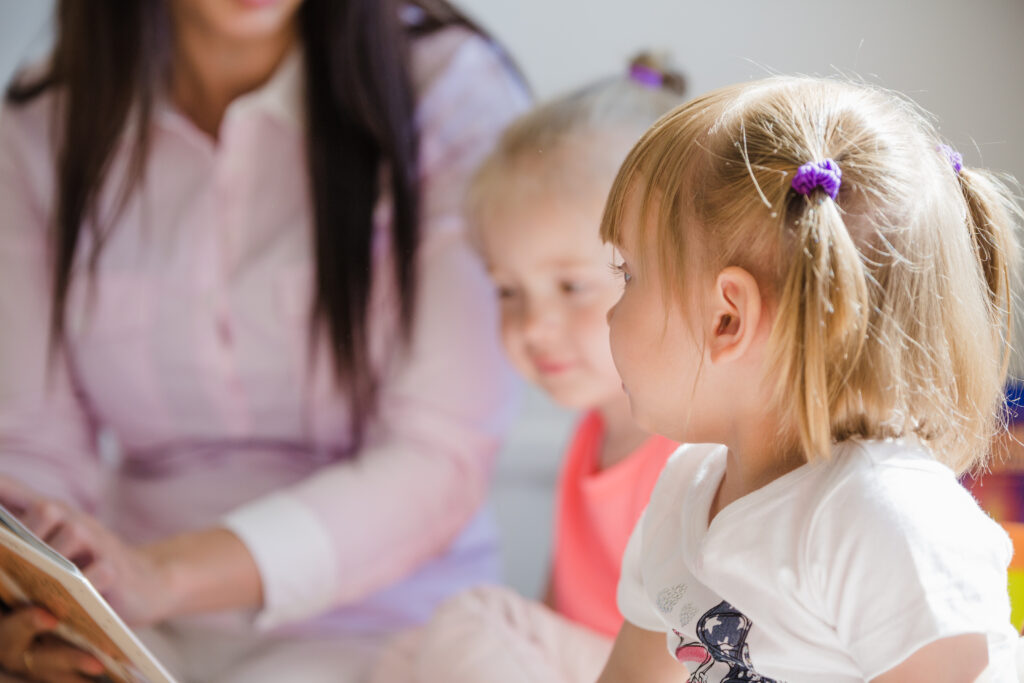
There are ‘rookie mistakes’ that the inexperienced nursery teacher needs to avoid, such as reading a book to children in groups so large that they cannot hear or see properly and reading to them just before lunch when they are hungry. If nursery children are fidgety, you will spend the whole session telling them to stop rather than focusing on the reading! This situation is easily avoided by training and by watching more experienced colleagues. It helps to put yourself in the place of a child who wants to be enthralled by the story.
Nursery teachers need to be communication researchers, always listening to and observing what is troubling and interesting to children. For example, the post-COVID-19 findings show a gap in children’s vocabulary, short concentration spans and poor listening that must be tackled.
To help children become eager emergent readers, nursery teachers need to:
- Know the pleasure of reading and what reading is good for
- Have access to good quality books
- Know how books work
- Provide lots of talking and conversations
- Understand language and writing
- Understand the link between sounds and letter symbols
- Implement interventions when needed.
Here are some of my longstanding nursery book favourites:
- Nursery Rhymes and Children’s Games by Peter and Iona Opie
- The Tale of Peter Rabbit by Beatrix Potter
- Farmer Duck by Martin Waddell
- I Don’t Like Peas by Marie Vinje and Robin Koontz
- Somebody Swallowed Stanley by Sarah Roberts
- Julian is a Mermaid by Jessica Love
- The Worst Princess by Anna Kemp
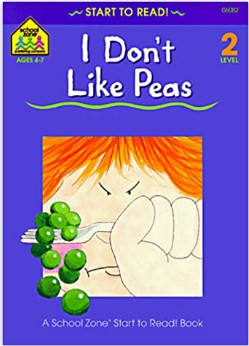
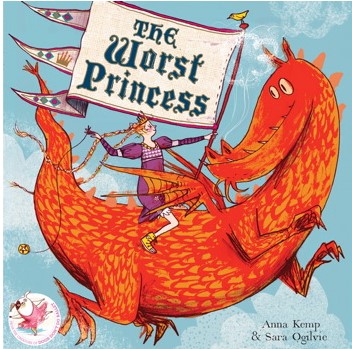
And my little nieces have just introduced me to Lily at Lissadell by Judi Curtin and The Silent Owl by Clemency Pearse.

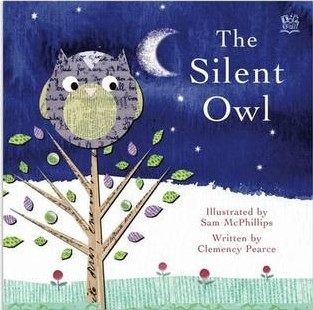
Not every family can afford to buy books, so they are a real treat for many children. Good nurseries take their children to the library and celebrate them as a community resource for great books. Books are for all, and if we are to offer nursery children fair access to literacy-rich nurseries, books must be right at the heart of each one.
Thank you for visiting our blog. Our vision here at Books2All is a world where every child finds the books that help them reach their true potential. If you have spare books in good condition at home that you think might be appropriate for school children or represent a school and would like to register to receive donated books, please download the Books2All app from the App Store or Google Play.
Bottom inset image courtesy of freepik – www.freepik.com

